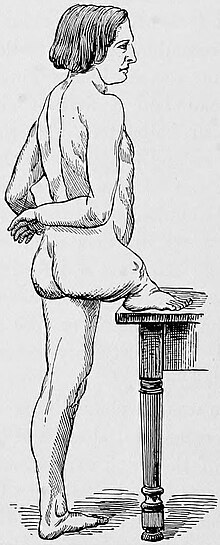Hemimelia
| Hemimelia | |
|---|---|
| Other names | Longitudinal meromelia |
 | |
| Terminal defect of an arm with transverse, incomplete hemimelia | |
| Specialty | Medical genetics |
Hemimelia is a birth defect consisting in unilateral or bilateral underdevelopment of the distal part of the lower or upper limb.[1] The affected bone may be shortened or not develop at all.[2][3]
Types of hemimelia

Transverse hemimelia is a congenital absence of part or all of a limb (including hand or foot) and is called amelia when the entire limb is missing.[2][4] Paraxial hemimelia means partial absence of one of the elements of the limb in the longitudinal axis (in phocomelia there is no complete absence of a part of the limb).[2]
Sub types of hemimelia are the following:
- Fibular hemimelia, Congenital longitudinal deficiency of the fibula or fibular longitudinal meromelia[5]
- Tibial hemimelia, Congenital longitudinal deficiency of the tibia, Congenital aplasia and dysplasia of the tibia with intact fibula, Congenital longitudinal deficiency of the tibia or tibial longitudinal meromelia[6]
- Radial hemimelia, Congenital longitudinal deficiency of the radius, radial clubhand, radial longitudinal meromelia or radial ray agenesis[7]
- Ulnar hemimelia, Congenital longitudinal deficiency of the ulna, ulnar clubhand or ulnar longitudinal meromelia[8]
References
- ^ "hemimelia", The Free Dictionary, retrieved 2023-03-20
- ^ a b c Bowen, Richard E.; Otsuka, Norman Y. (2020). "The Child with a Limb Deficiency". rchsd.org. Retrieved 2023-03-20.
- ^ Lorkowski, Jacek; Zakrzewska, Urszula; Hładki, Waldemar (2006). "Anatomiczne podstawy klasyfikacji wrodzonych ubytków kończyn". Przegląd Lekarski. 63, supl. 5. ISSN 0033-2240.
- ^ CDC (2021-03-18). "Amelia". Centers for Disease Control and Prevention. Retrieved 2023-03-20.
- ^ Orphanet 93323
- ^ Orphanet 93322
- ^ Orphanet 93321
- ^ Orphanet 93320
